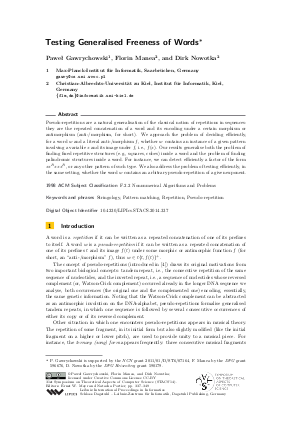Testing Generalised Freeness of Words
Authors Pawel Gawrychowski, Florin Manea, Dirk Nowotka
-
Part of:
Volume:
31st International Symposium on Theoretical Aspects of Computer Science (STACS 2014)
Part of: Series: Leibniz International Proceedings in Informatics (LIPIcs)
Part of: Conference: Symposium on Theoretical Aspects of Computer Science (STACS) - License:
 Creative Commons Attribution 3.0 Unported license
Creative Commons Attribution 3.0 Unported license
- Publication Date: 2014-03-05
File

PDF
LIPIcs.STACS.2014.337.pdf
- Filesize: 0.67 MB
- 13 pages
Document Identifiers
Subject Classification
Keywords
- Stringology
- Pattern matching
- Repetition
- Pseudo-repetition
Metrics
- Access Statistics
-
Total Accesses (updated on a weekly basis)
0PDF Downloads0Metadata Views
Abstract
Pseudo-repetitions are a natural generalisation of the classical notion of repetitions in sequences: they are the repeated concatenation of a word and its encoding under a certain morphism or antimorphism (anti-/morphism, for short). We approach the problem of deciding efficiently, for a word w and a literal anti-/morphism f, whether w contains an instance of a given pattern involving a variable x and its image under f, i.e., f(x). Our results generalise both the problem of finding fixed repetitive structures (e.g., squares, cubes) inside a word and the problem of finding palindromic structures inside a word. For instance, we can detect efficiently a factor of the form xx^Rxxx^R, or any other pattern of such type. We also address the problem of testing efficiently, in the same setting, whether the word w contains an arbitrary pseudo-repetition of a given exponent.
Cite As Get BibTex
Pawel Gawrychowski, Florin Manea, and Dirk Nowotka. Testing Generalised Freeness of Words. In 31st International Symposium on Theoretical Aspects of Computer Science (STACS 2014). Leibniz International Proceedings in Informatics (LIPIcs), Volume 25, pp. 337-349, Schloss Dagstuhl – Leibniz-Zentrum für Informatik (2014)
https://doi.org/10.4230/LIPIcs.STACS.2014.337
BibTex
@InProceedings{gawrychowski_et_al:LIPIcs.STACS.2014.337,
author = {Gawrychowski, Pawel and Manea, Florin and Nowotka, Dirk},
title = {{Testing Generalised Freeness of Words}},
booktitle = {31st International Symposium on Theoretical Aspects of Computer Science (STACS 2014)},
pages = {337--349},
series = {Leibniz International Proceedings in Informatics (LIPIcs)},
ISBN = {978-3-939897-65-1},
ISSN = {1868-8969},
year = {2014},
volume = {25},
editor = {Mayr, Ernst W. and Portier, Natacha},
publisher = {Schloss Dagstuhl -- Leibniz-Zentrum f{\"u}r Informatik},
address = {Dagstuhl, Germany},
URL = {https://drops.dagstuhl.de/entities/document/10.4230/LIPIcs.STACS.2014.337},
URN = {urn:nbn:de:0030-drops-44694},
doi = {10.4230/LIPIcs.STACS.2014.337},
annote = {Keywords: Stringology, Pattern matching, Repetition, Pseudo-repetition}
}
